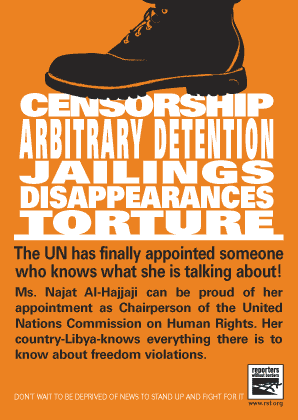When the new Libyan president of the United Nations Human Rights Commission, Najat Al-Hajjaji, made her inaugural speech at the opening of the 59th session of the Commission in Geneva on 17th March 2003 she was interrupted by six activists from Reporters Without Borders who threw leaflets into the meeting room. (Reporters Without Borders are also known as Reporters san Frontieres or just RSF)
As a result the pressure group may have its UN consultative status suspended. The way this harsh punishment has been decided and the process that led to this decision is farcical and sets a precedent that should not be allowed to stand.
The chair of the United Nations Human Rights Commission Committee usually rotates between various regional groups. The regional group who’s turn it is nominates someone and that person is unanimously elected by acclamation. At least that’s the way it worked for 46 years until South African Sipho George Nene nominated Libyan Najat Al-Hajjaji for the job. The Americans were not happy with the choice due to Libya’s poor human rights record and insisted on a vote. The charter of the commission required a secret ballot that was duly conducted on January 20th 2003.
The 53 members of the committee voted as follows.
- 33 In favor of Najat Al-Hajjaji as president -17 Abstained -3 Against
The Third World Network an independent non-profit network involved in issues relating to development and the Third World reported:
South Africa’s Sipho George Nene, who had proposed the name of Ms. Najat Al-Hajjaji for the chair, in a statement before the ballot (which the US had requested) said that the Commission and the African Group had been placed in a difficult and unenviable position. It was regrettable that the US delegation had opted for the extreme method of demonstrating its non-endorsement of the African Group’s candidate. The decision to propose Ms. Najat Al-Hajjaji’s name had been taken by the highest political organ of the African Union. The group hence had no choice but to respond to the political challenge posed by the subjection of the election to a vote.
For 46 years, the tried and tested practice of the unanimous election of the Chair of the commission had contributed positively in setting a solid foundation for the proceedings of the Commission. This “reliable practice” had been violated today. But the African group hoped that this unfortunate act would not be emulated in the future. “The rights of regional groups to present candidates of their choice should be respected.” Great efforts had been made to persuade the US to use other available methods to express its displeasure. But these had failed. The African group urged members to demonstrate their confidence in the tried and tested methods of the past by voting for the African candidate with a resounding majority.
Geneva, 20th January 2003 Chakravarthi Raghavan
On the 18th March 2003, one day after the leaflet throwing incident at the opening session, the American representative Jeane Kirkpatrick had the following to say
Some criticism aimed at the Commission overlooks positive steps taken in recent sessions, but the widespread overall impression shared by many is that too many serious and systematic abuses of human rights go unchallenged or even covered-up in this body. The practice of electing the Commission members from some of the world’s worst human rights offenders is especially serious. The cynical resort to procedural tactics to avoid taking a position on human rights abuses has not gone unnoticed and is widely and rightly criticized.
The government and the people whom I have the privilege of representing want the Commission to keep the faith placed in it by the United Nations’ founders when they envisioned the prospect of a body devoted to the promotion and protection of fundamental human rights…
Address by Ambassador Jeane Kirkpatrick Head of the U.S. Delegation to the United Nations Commission on Human Rights Palais des Nations March 18, 2003
As a result of the leaflet throwing incident Cuba called for the suspension of RSF’s consultative status for one year. France called for no action to be taken and for due process to be followed which would allow RSF a chance to appear before the UN’s Committee on Non-Governmental Organizations before any action was taken. The committee took a vote on the 20th May 2003. Of the 19 members the voting came out as follows
- In favor of a ban – China, Côte d’Ivoire, Cuba, Iran, Pakistan, Russia, Sudan, Turkey and Zimbabwe
- Abstained – Cameroon, Colombia, India and Senegal
- In favor of no action – Germany, Chile, the United States, France, Peru and Romania
No due process was permitted and RSF were not given a chance to appear before the committee. RSF have pointed out the considerable irony of this result in a press release on their website they say:
All this would be laughable…if it did not show up the decay of the UN system, which has some of the world’s worst human rights violators giving lessons to those who denounce their actions and defend their victims.
On May 30th 2003 Sergio Vieira de Mello, the UN High Commissioner for Human Rights, said he opposes any attempt to exclude Reporters Without Borders from the United Nations by challenging its current observer status. But he cautioned.
As you know, these decisions are not taken by us or by the UN secretary-general, but by a committee in New York that deals with such matters.
To take effect, the move to ban RSF must be endorsed by the UN General Assembly’s Economic and Social Council, which will consider the proposal in Geneva between July 1st and 24th at the ECOSOC session. Who knows what is going to happen then? One thing seems certain to me the UN is broken, possibly beyond repair.
